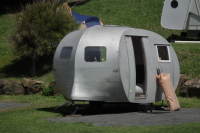
Identifying all of the costs involved for a business to produce its goods is a fundamental element to business sustainability. Costs that may be ignored or hidden can become a significant threat to the survival of a business.
A few years ago I was contacted by an enthusiastic entrepreneur to discuss a business opportunity that he had been working on for about a year. The entrepreneur was keen to transform his tried and tested idea into a sustainable business with a unique line of product and requested some Business Mentor guidance.
The excited entrepreneur requested that I meet with him at his facility to inspect his product at the manufacturing facility, with a mindset to evolve the opportunity further. I arrived at the address which happened to be a farmhouse with an average sized double garage. I also noticed his vehicle parked outside, indicating that the garage may be the manufacturing facility.
From a Business Mentoring prospective, I’ve witnessed a number of successful businesses that had started from merger beginnings in small hidden away facilities and grown over time to significant business entities, hence the understanding of the entrepreneur wanting to start his business in a small domestic environment wasn’t so unusual.
After our introductions with the entrepreneur providing an overview of his product and his desire to develop his product into a business, I was given a tour of the manufacturing area (the garage) to view the operation. The entrepreneur had explained that he had purchased an antique shaped caravan some time ago that was still positioned in one corner of the garage. He was so taken by the style of the caravan that he decided to create model sized caravans of the same shape to be sold as letter boxes. From a Business Mentoring lens, I was intrigued to learn more.
The end product looked quite professional yet somewhat complicated in its construction. The entrepreneur went on to explain that he had decided to paint the caravan letter boxes in a range of colours so they would be more unique and special to each customer. I asked the entrepreneur what the cost of materials would be to make each letterbox, to which he responded “the materials aren’t cheap, it costs me about $90.00 in materials to make each one and that doesn’t include the fastenings or the paint”
I then inquired as to how much the entrepreneur had been selling each letterbox for. “I can only sell them for $110.00 as people can’t afford much more than that for a letterbox” I further asked how many he would produce in a week. “Well, there’s a lot of time and effort that goes into making them yet I’ve refined the process so I can now make two a week”
From a Business Mentoring prospective I started forming a mental a picture of business viability pretty quick, yet there were another couple of questions I simply needed to ask, such as how many had he sold. The response was “So far I’ve made 18 and I’ve sold 6, but the customers that have bought caravan letterboxes really like them”
A quick assessment of financial viability would indicate that the entrepreneur would not survive on making caravan letterboxes alone so I asked with some amount of hope if there was any additional product as part of the business opportunity, which he responded “no, I only like making caravan letterboxes”
When entering into a business or upgrading an existing business, it’s beneficial to have all the costs of the operation and all the ingredients included in the cost of the goods being produced, with a good understanding of the operational ability to supply enough goods to sustain the business.
From a Business Mentoring prospective, I’m aware of a number of enthusiastic business operators work long hours for many months on end producing goods to ensure the business remains sustainable, whilst they are prepared not to pay themselves for the hard work they have applied to the business.
To ensure a business is sustainable, it’s necessary to assess if there is enough product margin gained to provide a level of profitability that allows the business to be financially viable.
For the smaller business entities there are a wide range of simple accounting software tools that may be used to assist with identifying all of the costs involved in producing goods for the market, whether the goods are a product or a service. For some that prefer not to work with the finances, they would benefit from contracting an accountant, book keeper or similar service provider in the financial sector to guide them through the cost analysis of viability in producing their goods for the market.
If the cost of goods is high and there is very little benefit to be gained, it may be that the opportunity is not viable for the business. Sometimes it’s better to walk away from what might be an opportunity of passion and possibly revisit the opportunity in the future, rather than struggle through multiple hurdles in the hope that the hurdles will simply go away.
If you would like any further Business Mentoring information or support in the understanding of the cost of business entry or continued operation, or you seek support in working through the cost of business entry or continued operation, please contact us.
